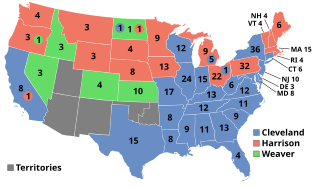
Presidential elections were held in the United States on November 8, 1892. In the fourth rematch in American history, the Democratic nominee, former president Grover Cleveland, defeated the incumbent Republican President Benjamin Harrison. Cleveland's victory made him the first president in American history to be elected to a non-consecutive second term, a feat not repeated until Donald Trump was elected in 2024. The 1892 election saw the incumbent White House party defeated in three consecutive elections, which did not occur again until 2024.
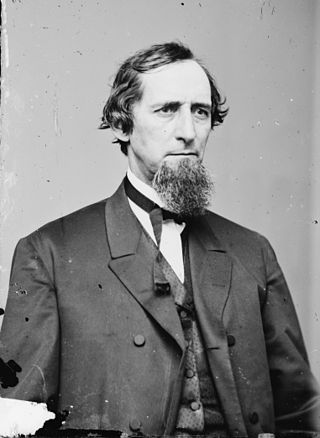
Edgar Cowan was an American lawyer and Republican politician from Greensburg, Pennsylvania. He represented Pennsylvania in the United States Senate during the American Civil War.

Augustus Everett Willson was an American politician and the 36th Governor of Kentucky. Orphaned at the age of twelve, Willson went to live with relatives in New England. This move exposed him to such authors as Ralph Waldo Emerson, Henry Wadsworth Longfellow, Oliver Wendell Holmes, and James Russell Lowell, who were associates of his older brother, poet Forceythe Willson. He was also afforded the opportunity to attend Harvard University, where he earned an A.B. in 1869 and an A.M. in 1872. After graduation, he secured a position at the law firm of future Supreme Court justice John Marshall Harlan. Willson and Harlan became lifelong friends, and Willson's association with Harlan deepened his support of the Republican Party.
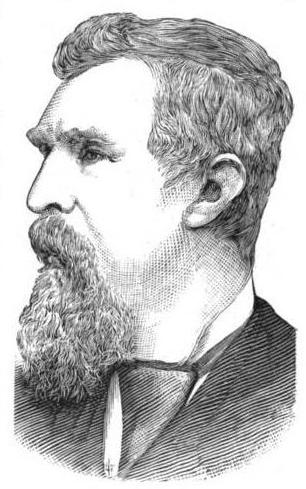
Henry Smith was a millwright, architect, builder and politician who was elected a member of the United States House of Representatives from Wisconsin from 1887 - 1889 as a member of the Union Labor Party. He also served as a Socialist member of the Wisconsin State Assembly in 1878. At different times, Smith ran for office on the Socialist, Greenback, Democratic and Union Labor tickets.
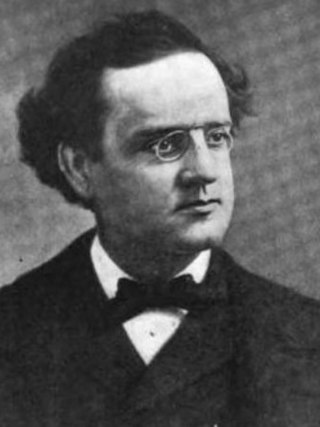
Thomas MacDonald Waller was an American attorney, politician and the 51st Governor of Connecticut.

The 1888 Republican National Convention was a presidential nominating convention held at the Auditorium Building in Chicago, Illinois, on June 19–25, 1888. It resulted in the nomination of former Senator Benjamin Harrison of Indiana for president and Levi P. Morton of New York, a former Representative and Minister to France, for vice president. During the convention, Frederick Douglass was invited to speak and became the first African-American to have his name put forward for a presidential nomination in a major party's roll call vote; he received one vote from Kentucky on the fourth ballot.

The 1884–85 United States Senate elections were held on various dates in various states, coinciding with the presidential election of 1884. As these U.S. Senate elections were prior to the ratification of the Seventeenth Amendment in 1913, senators were chosen by state legislatures. Senators were elected over a wide range of time throughout 1884 and 1885, and a seat may have been filled months late or remained vacant due to legislative deadlock. In these elections, terms were up for the senators in Class 3.

William O'Connell Bradley was an American politician from the state of Kentucky. He served as the 32nd Governor of Kentucky and was later elected by the state legislature as a U.S. senator from that state. The first Republican to serve as governor of Kentucky, Bradley became known as the father of the Republican Party in Kentucky.

The 1885 United States Senate election in Illinois was held from February 18 to May 19, 1885. The contentious election was determined by a joint session of the Illinois General Assembly. Incumbent Republican United States Senator John A. Logan, seeking a third term in the United States Senate, was unanimously nominated by a Republican caucus. However, some assemblymen expressed concern about the candidate and abstained from supporting him.
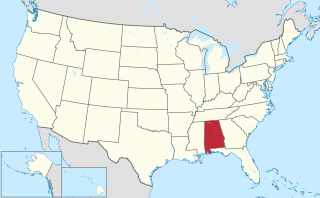
Following is a table of United States presidential elections in Alabama, ordered by year. Since its admission to statehood in 1819, Alabama has participated in every U.S. presidential election except the election of 1864, during the American Civil War, when the state had seceded to join the Confederacy.

In the Chicago mayoral election of 1907, Republican Fred A. Busse defeated Democratic incumbent Edward F. Dunne.

In the Chicago mayoral election of 1915, Republican William Hale Thompson defeated Democrat Robert Sweitzer.

In the Chicago mayoral election of 1903, Democrat Carter Harrison Jr. was reelected to a fourth term, defeating Republican nominee Graeme Stewart.

The 1880 Maine gubernatorial election was held on September 13, 1880 for a two-year term that was scheduled to run from January 13, 1881 to January 3, 1883. The contest resulted in the victory of Greenback and Democratic nominee Harris M. Plaisted, who narrowly defeated incumbent Republican governor Daniel F. Davis, one of the few times Republicans lost control of the governorship between the founding of the party in the 1850s and the Great Depression. This was the first gubernatorial election in Maine in which a plurality of the popular vote was sufficient to elect the governor, in accordance with a constitutional amendment ratified the same day.
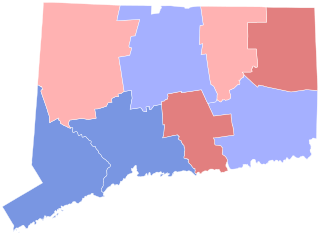
The 1890 Connecticut gubernatorial election was held on November 4, 1890. Democratic nominee Luzon B. Morris defeated Republican nominee Samuel E. Merwin with 50.01% of the vote.

The 1888 Connecticut gubernatorial election was held on November 6, 1888. Republican nominee Morgan Bulkeley defeated Democratic nominee Luzon B. Morris with 47.94% of the vote.

The 1878 Connecticut gubernatorial election was held on November 5, 1878. Republican nominee Charles B. Andrews defeated Democratic incumbent governor Richard D. Hubbard with 46.66% of the vote.

The 1907 Massachusetts gubernatorial election was held on November 5. Incumbent Republican Governor Curtis Guild Jr. was re-elected for a third one-year term.



















